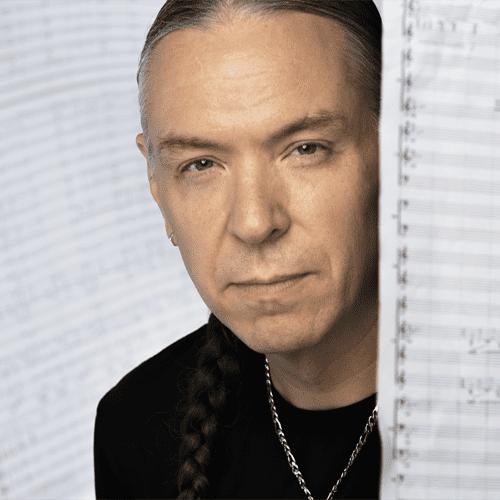“…evocative and skillfully written…”
Works by Jerod Impichcha̱achaaha' Tate

Available on Amazon
San Francisco Symphony and Chorus
Edwin Outwater, Conductor
Christine Bailey Davis, Flute
Thomas Robertello, Flute
Tate is rare as an American Indian composer of classical music. Rarer still is his ability to effectively infuse classical music with American Indian nationalism.
Washington Post
Tracing Mississippi, Concerto for Flute and Orchestra
- Taloowa' (Song)
- Missipi' Aabi (Tracing Mississippi)
- Shilombish Anompoli' (Talking Spirits)
- Halshi' Hiloha (Sun Thunder) [6:31]
Christine Bailey Davis, Flute
Mississippi was the original homeland of the Chickasaw Nation until our removal to Indian Territory (now called Oklahoma) in the 1830's. This removal is commonly known as the Trail of Tears, and involved numerous tribes from the Southeastern United States.
Tracing Mississippi is a remembrance of the old country my family lived in and incorporates traditional songs and dance rhythms, along with American Indian percussion instruments. In particular, the opening solo flute quotes the Chickasaw Garfish Dance song. The Choctaw hymn, entitled Worth of the Soul, is quoted by the horn quartet during the final build of the first section (Taloowa'). Specific rhythms throughout the work are derived from Southeast Indian and other American Indian sources.
Also included is an original melody by my Comanche colleague and dear friend, composer and pianist, Dr. David Bad Eagle Yeagley. This melody appears in the third section (Shilombish Anompoli'), played by the solo flute in trio with the piccolo trumpet playing the Choctaw hymn, and the vibraphone and crotales playing a segment of the Garfish Dance song. The Comanche melody is an expression of the beautiful, mournful and distant voice of the Moon.
I̱holba' (The Vision) for Solo Flute, Orchestra, and Chorus - Halbina' (The Gift)
- Iholba' (The Vision)
Thomas Robertello, Flute
I̱holba' (The Vision) is a work inspired by the composer’s native Chickasaw culture. The Chickasaw Nation originally lived in the Southeastern United States and was eventually relocated to Indian Territory, which is now the state of Oklahoma. The musical material of I̱holba' is based on a Chickasaw Garfish Dance song and is performed in the Chickasaw language. The text is original poetry by the composer, and the translation was provided by Onita Carnes, Catherine Wilmond and Pamela Munro.
